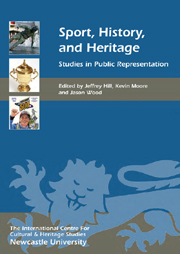Book contents
- Frontmatter
- Contents
- List of Illustrations
- Acknowledgments
- Sport, History and Heritage: An Investigation into the Public Representation of Sport – Editors' General Introduction
- HISTORY, HERITAGE AND SPORT
- 1 Sport, History and Imagined Pasts
- 2 Discredited Class-war Fable or Priceless Promotional Asset? The Duality of Rugby Union's William Webb Ellis Foundation Myth
- 3 Cricket Writing, Heritage and Ideology
- 4 Football and the Fine Arts: The Football Association Art Competition and Exhibition, 1953
- 5 ‘It's Nice to Belong’: Boxing, Heritage and Community in London
- 6 Television and the ‘Austerity Games’: London 1948
- MUSEUMS AND THE REPRESENTATION OF SPORT
- SURVIVALS AND LEGACIES: SPORT, HERITAGE AND IDENTITY
- Afterword: History and Heritage in Sport
- List of Contributors
- Index
- HERITAGE MATTERS
6 - Television and the ‘Austerity Games’: London 1948
from HISTORY, HERITAGE AND SPORT
Published online by Cambridge University Press: 05 April 2013
- Frontmatter
- Contents
- List of Illustrations
- Acknowledgments
- Sport, History and Heritage: An Investigation into the Public Representation of Sport – Editors' General Introduction
- HISTORY, HERITAGE AND SPORT
- 1 Sport, History and Imagined Pasts
- 2 Discredited Class-war Fable or Priceless Promotional Asset? The Duality of Rugby Union's William Webb Ellis Foundation Myth
- 3 Cricket Writing, Heritage and Ideology
- 4 Football and the Fine Arts: The Football Association Art Competition and Exhibition, 1953
- 5 ‘It's Nice to Belong’: Boxing, Heritage and Community in London
- 6 Television and the ‘Austerity Games’: London 1948
- MUSEUMS AND THE REPRESENTATION OF SPORT
- SURVIVALS AND LEGACIES: SPORT, HERITAGE AND IDENTITY
- Afterword: History and Heritage in Sport
- List of Contributors
- Index
- HERITAGE MATTERS
Summary
INTRODUCTION
The Olympic flame has been extinguished; Fanny Blankers-Koen, that extraordinary Dutch athlete, and the other heroines and heroes have returned to the bosoms of their families; and Wembley Stadium reverts to dog racing and similar local pursuits. It must be for other nations to record what they think of Britain's achievement as a host, but the general impression appears to be that, granted the restrictions in our pinched Europe, we did not do too badly. […] the broadcasting arrangements went pretty smoothly. One hundred and fifty BBC commentators and reporters and one hundred and twenty representatives of overseas broadcasting organisations functioned from the old Palace of Arts; eighty-five lines connected Wembley with Broadcasting House; and the number of recordings made each day was prodigious. Those happy enough to enjoy the pleasures of television also appear to have been well satisfied, the more enthusiastic viewers remarking that it was as good as going to the Games.
(The Listener 1948a)The BBC has paid around £40–50 million for the broadcast rights to the London 2012 Olympic Games. For that amount of money taxpayers will be able to enjoy 5,800 hours of content. Do the sums. That is 242 days and nights bleary-eyed straight on the couch. […] That means that every hour of every sport will be aired. The 5,800 hours of host content will all be in high definition.
(Magnay 2010)- Type
- Chapter
- Information
- Sport, History, and HeritageStudies in Public Representation, pp. 77 - 90Publisher: Boydell & BrewerPrint publication year: 2012



